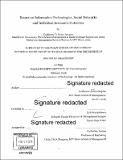Essays on Information Technologies, Social Networks and Individual Economic Outcomes
Author(s)
Saint-Jacques, Guillaume B
DownloadFull printable version (12.10Mb)
Other Contributors
Sloan School of Management.
Advisor
Erik Brynjolfsson.
Terms of use
Metadata
Show full item recordAbstract
This four-part thesis focuses on the effect of Information Technologies and individual economic outcomes. The first two papers investigate the relationship between technology and individual pay. The last two focus on connectivity through social and communication networks and labor market outcomes. The first paper offers a simple model of how technology may be reshaping the distribution of individual income in the US between 1960 and 2008. First, is shows fractal patterns of the income distribution, which indicate the presence of an increasingly unequal power law distribution at the top. Then, using IRS individual tax data, it shows two main trends: first, more and more individuals seem to draw their income from a Pareto distribution rather than a Lognormal distribution (typical of the "industrial economy"). Second, the tail index of the Pareto distribution seems to be getting lower, indicating increasing inequality at the top. The second paper investigates the relationship between Information Technologies and CEO Pay. It shows, both at the industry and at the firm level, that IT intensity seems to increase CEO Pay. It shows support for three distinct mechanisms: first, IT makes firms bigger. Second, it increases their effective size (the size effectively affected by CEO decisions). Third, it increases mobility of CEOs, possibly because managing IT-intensive companies requires relatively more general skills. The third paper is the first to match, at the individual level, complete Call Detail Records data with individual income for over 100,000 individuals. This allows to describe the associations between individual income and patterns of individual's social networks. We find that wealthier individuals have higher degree, much higher network diversity, higher local centrality, and more social engagement, but lower density and reciprocity in their individual networks. The last paper attempts a causal study of the relationship between social tie strength and individual labor market outcomes (measured as job mobility) using LinkedIn's People-You- May-Know randomizations. It shows an inverted U-shape relationship between tie strength and job transmissions, as well as a globally negative relationship between clustering coefficient and labor market mobility, suggesting that even individually, strong ties are not always more useful than weak ties.
Description
Thesis: Ph. D., Massachusetts Institute of Technology, Sloan School of Management, 2018. Cataloged from PDF version of thesis. Includes bibliographical references.
Date issued
2018Department
Sloan School of ManagementPublisher
Massachusetts Institute of Technology
Keywords
Sloan School of Management.